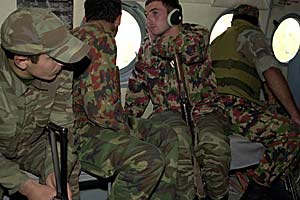
FRANCE LEADS THE EU’S NYET TO GEORGIA BORDER MONITORING
Publication: Eurasia Daily Monitor Volume: 2 Issue: 76
By:

Meeting in Luxembourg on April 15-16, the ministers of foreign affairs of the European Union’s 25 member countries missed the last chance for the EU to undertake an unarmed border-monitoring operation in Georgia. Since December the Georgian government and several friendly countries had asked the EU to provide some form of replacement for the OSCE’s Georgia Border Monitoring Operation (BMO), which Russia (with ample advance notice) terminated on January 1. The EU’s refusal to fill the void exposes Georgia to Russian military threats along the Chechen, Ingush, and Dagestani border sectors. It deals another setback to the EU’s Common Foreign and Security Policy (CFSP); and it adds to the disquieting signals in the run-up to the May 10 EU-Russia summit in Moscow (see EDM, April 6, 11).
The EU’s External Affairs Commissioner, Benita Ferrero-Waldner, confirmed to the press after the ministerial meeting that Georgia had asked the EU to take over the border monitoring mission from the OSCE. However, according to her, the EU wants Georgia to negotiate a bilateral border protection agreement with Russia (Reuters, Interfax, April 15, 16). Such a solution, eliminating the international presence and leaving Georgia alone to face Russia on that border, is precisely what Georgia and supportive countries within the EU had tried hard to avoid. Ferrero-Waldner’s statement also confirms that the Russia-First approach of some EU member governments prevailed on this issue, presumably overriding the External Affairs Commissioner’s own views.
Throughout the debate within the EU from January to the Luxembourg meeting, the Baltic states were leading advocates of an EU border monitoring operation in Georgia (BNS, April 15, 16). Held for the most part within the EU’s Political and Security Committee, the discussions focused on a wide range of options, ultimately short-listed to four, of which the EU chose the weakest possible.
One option envisaged EU taking over, under its flag and as part of CFSP, the full-scale monitoring operation from the OSCE. The next option, in deference to the Russia-First views of some countries, proposed renouncing the EU’s aegis for the monitoring operation and creating instead a group of willing countries (a “coalition of the willing”) for this unarmed mission. The next weaker option would have involved an EU training mission for Georgian border guards, similar to the OSCE’s small-scale, symbolic, and redundant training mission in place since April 18, in no way substituting for the defunct BMO (see EDM, April 15).
The fourth, weakest option was finally adopted: sending three experts to work in Tbilisi and make periodic trips to the border. The office is under the jurisdiction of the EU’s Special Representative for the South Caucasus, Finnish diplomat Heiki Talvittie, who is based in Helsinki, and has become a byword for the EU’s overall ineffectiveness in the region. The decision to send those three experts to Tbilisi is officially titled, “Enhancement of the Special Representative’s Office.” The number of observer may, theoretically, increase at some unspecified future time.
France led the opposition to a Georgia border-monitoring mission of the EU. Belgium, Italy, Spain, and Greece followed the French lead, as did Germany with some minor nuances. The same configuration tends to beset NATO decision-making processes as well. Among the large Western countries, only Britain joined the new members from Central Europe in showing an understanding of Georgia’s situation and the stakes for the EU. The French-led group of countries, ruling out an EU-flagged CFSP operation in deference to Russia, prevented the EU from scoring a badly needed success for the CSFP. Ironically, the same group of countries also vetoed a non-CFSP “coalition of the willing” by arguing that a mission by only some member countries would have undermined the CSFP.




